Setting a target to reduce food insecurity — Reflections on the Maple Leaf Centre for Food Security’s fourth annual Food Security Symposium
Inspiring hope and accelerating change to address the food insecurity crisis.
November 23, 2023
By Sarah Stern, Executive Director, Maple Leaf Centre for Food Security
On November 16, we were thrilled to host the Maple Leaf Centre for Food Security’s fourth annual Food Security Symposium. More than 160 people from government, the private sector, academia, and civil society gathered in Toronto to look at cross-sector approaches to address the increasingly dire food insecurity crisis in Canada.
The Maple Leaf Centre for Food Security (“the Centre”) was launched in 2016 with the mission of collaboratively cutting food insecurity in Canada in half by 2030. I shared in my opening remarks that this goal is big and audacious, especially since food insecurity has only worsened in Canada in the last several years. Currently, nearly seven million Canadians — including one in four children — are food insecure.
Now, there are seven years left to go to reach that goal and urgent action is needed more than ever. There are also so many reasons to feel hopeful about our collective ability to reach it, especially if we can work together.
This year’s Food Security Symposium aimed to shed light on some of areas for hope — like the progressive policy being advanced in Newfoundland and Labrador and the Canada Disability Benefit, the opportunity of scaled food prescriptions, streamlining government benefits, and examples of successful movement building to reduce child poverty. We ended the day by making a bold ask of our audience — to join us in the call to the Federal Government to set a target to reduce food insecurity. We know that bold goals drive action, and we believe this is what is needed to kickstart change.
Michael McCain, Honorary Chair of the Centre, kicked the Symposium off by imploring governments, private sector, and civil society to elevate the current crisis as a priority. “We need to work in unison towards a clear and attainable target to reduce food insecurity by 50% by 2030 and strive to eliminate severe food insecurity. This gives a runway of seven years — and that’s enough time to make the public policy and program reforms needed, enough time to get stakeholders engaged, and enough time to scale up interventions that make a sustained impact. We urgently need momentum.”
Diving into food insecurity data
In our first session of the day, speakers explored the relationship between poverty and food insecurity. My colleague, Merryn Maynard, Manager of Social Impact, spoke with experts Andrew Heisz, Director of the Centre for Income and Socioeconomic Well-being Statistics at Statistics Canada, Dr. Geranda Notten, Professor of Comparative Public Policy at the University of Ottawa, and Dr. Sharanjit Uppal, Senior Research Economist at Statistics Canada.
A key takeaway from the discussion is that many of the tools we use to measure poverty and food insecurity in Canada cannot capture the complexity of circumstances that result in these experiences. Andrew stated that, “Different people are often uniquely identified as being food insecure versus poor. Certain groups are at higher risk of being in poverty or food insecure. Both poverty and food insecurity are higher among Indigenous groups and racialized groups in Canada compared to others.”
Perhaps surprisingly, Dr. Uppal shared that 8 in 10 food insecure families are living above the poverty line, meaning they may be missed by many policy and program efforts. “We think that food insecurity is primarily prominent for those below the poverty line — but that’s not necessarily true.”
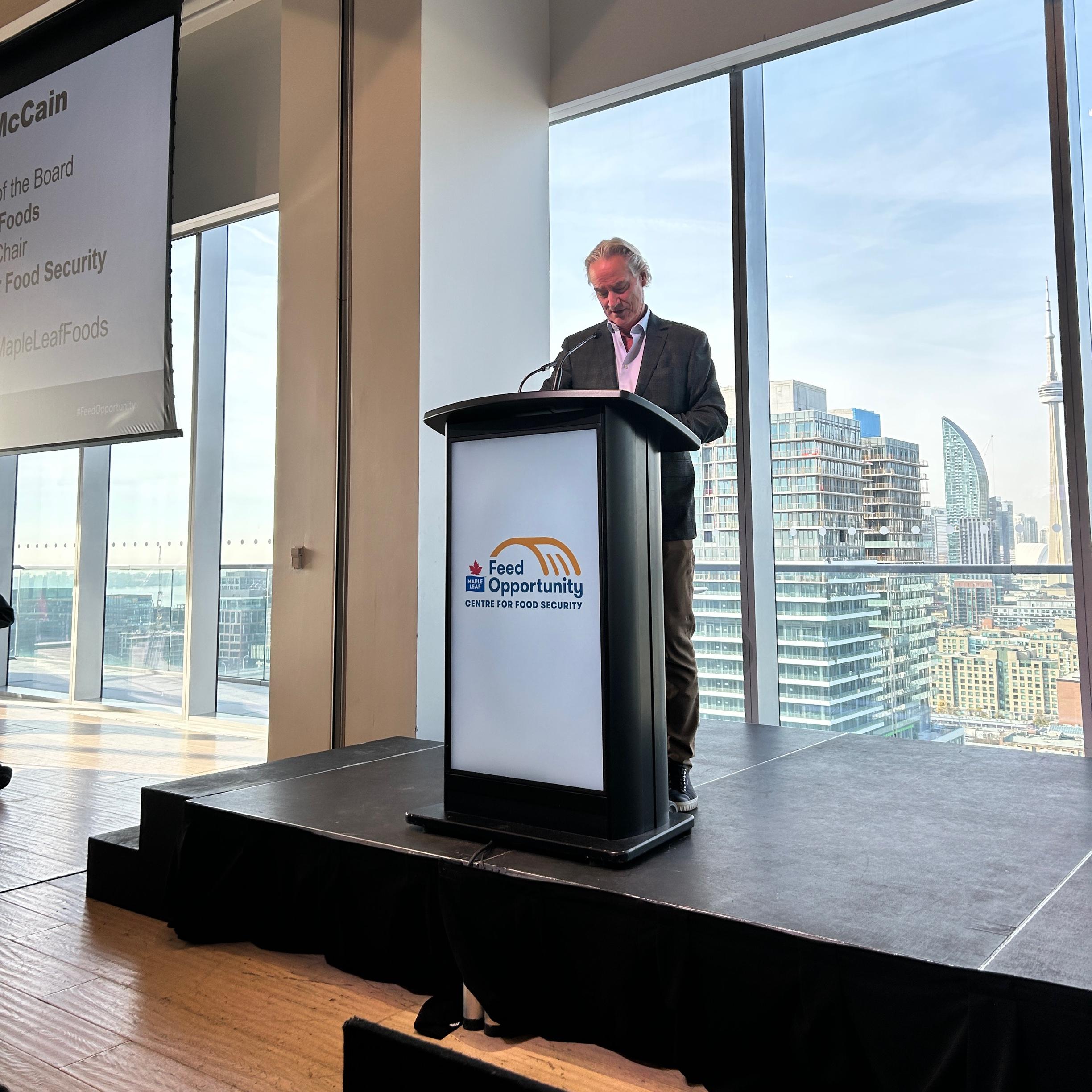
Michael McCain’s opening remarks.
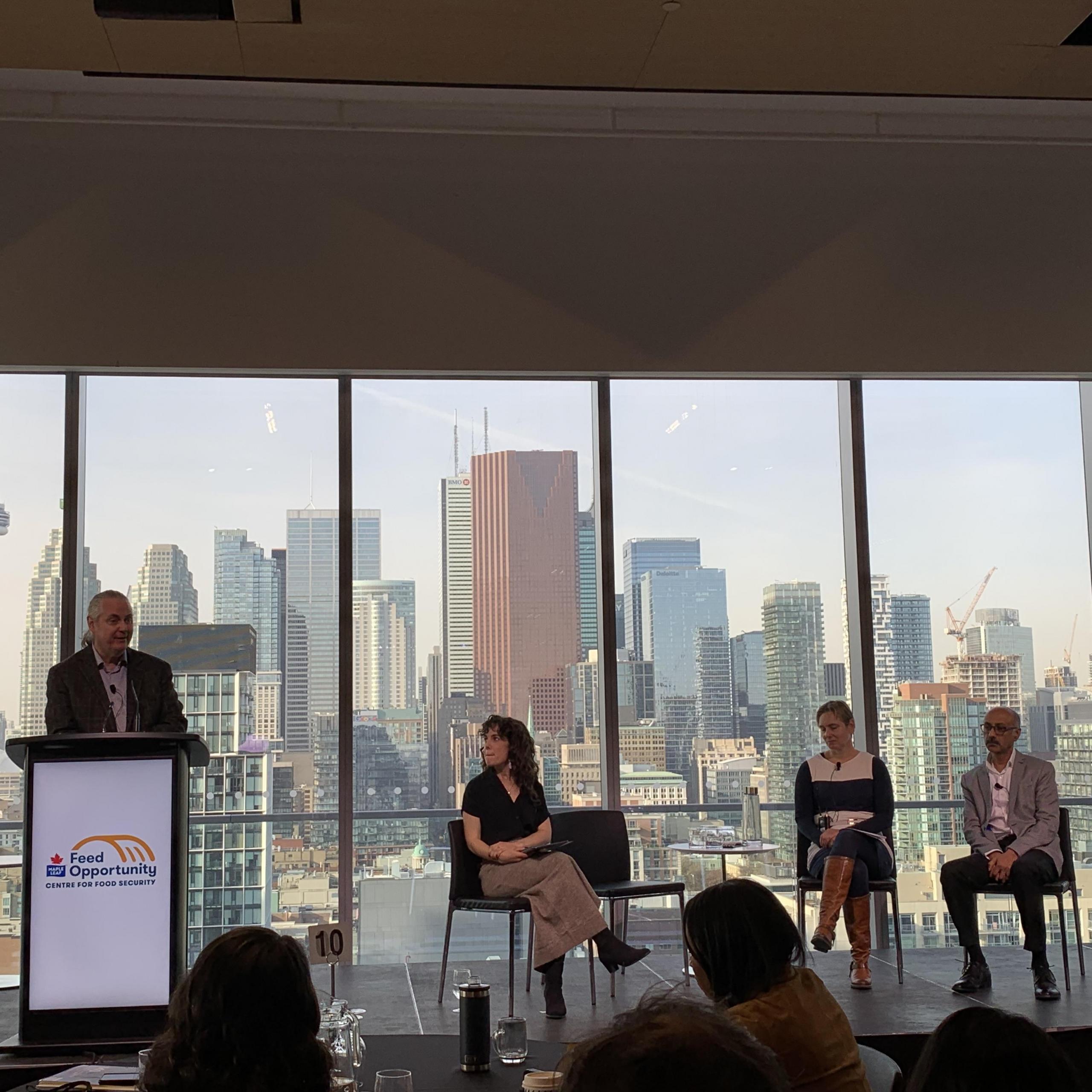
On the Insights on Poverty and Food Insecurity panel, Andrew Heisz speaks with moderator Merryn Maynard and other panelists Dr. Geranda Notten and Dr. Sharanjit Uppal.
Promising public policies
Did you know that 22% of the Canadian population have a disability and 46% of those people live below the poverty line? And 50% of people who are food insecure have a disability? Only 59% of people with disabilities are working, even though many more are capable of working with support. This is what Krista Carr, CEO of Inclusion Canada, shared during the Advancing Progressive Policy presentation.
Joined together with Aisling Gogan, Assistant Deputy Minister, Department of Children, Seniors and Social Development at the Government of Newfoundland & Labrador, and Dr. Kwame McKenzie, CEO of the Wellesley Institute, moderator David Herle, Principal Partner at Gandalf Group, hosted a riveting discussion on public policies that could have a large impact on reducing food insecurity.
One of those policies, the Canada Disability Benefit, is something we at the Centre have been pushing for, alongside many disability rights and anti-poverty organizations. This benefit would work to lift Canadians with disabilities out of poverty and food insecurity by guaranteeing a stable, basic income to pay for necessities like rent, food, and medical bills. Those with disabilities on current government supports are falling behind and often find themselves faced with the difficult decision of skipping meals due to minimal funds leftover at the end of each month after paying rent and important bills.
“We are anxiously waiting for the Canada Disability Benefit — and the waiting is freezing other action,” declared Aisling during this policy discussion.
Aisling also spoke of the exciting new policy efforts in Newfoundland and Labrador that aim to address the social determinants of health, including expanding an employment stability program, increasing supports for families of young children to reduce child poverty and food insecurity, and ‘basic income’ style programs for adults aged 60 to 64 and youth transitioning out of care. Stay tuned for more from the Centre about partnerships in Newfoundland!
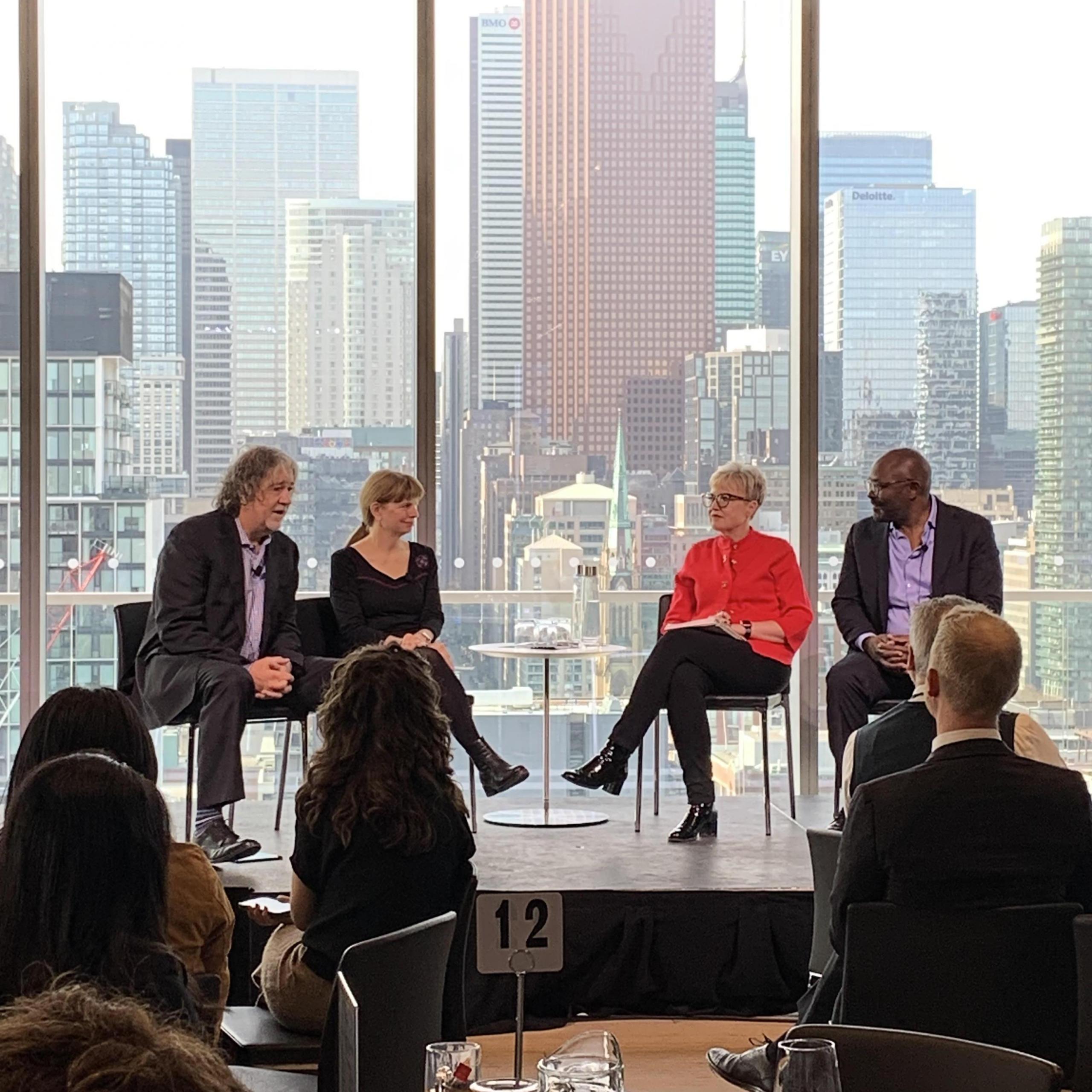
Advancing Progressive Policy panel with moderator David Herle, Ashling Gogan, Krista Carr, and Kwame McKenzie.
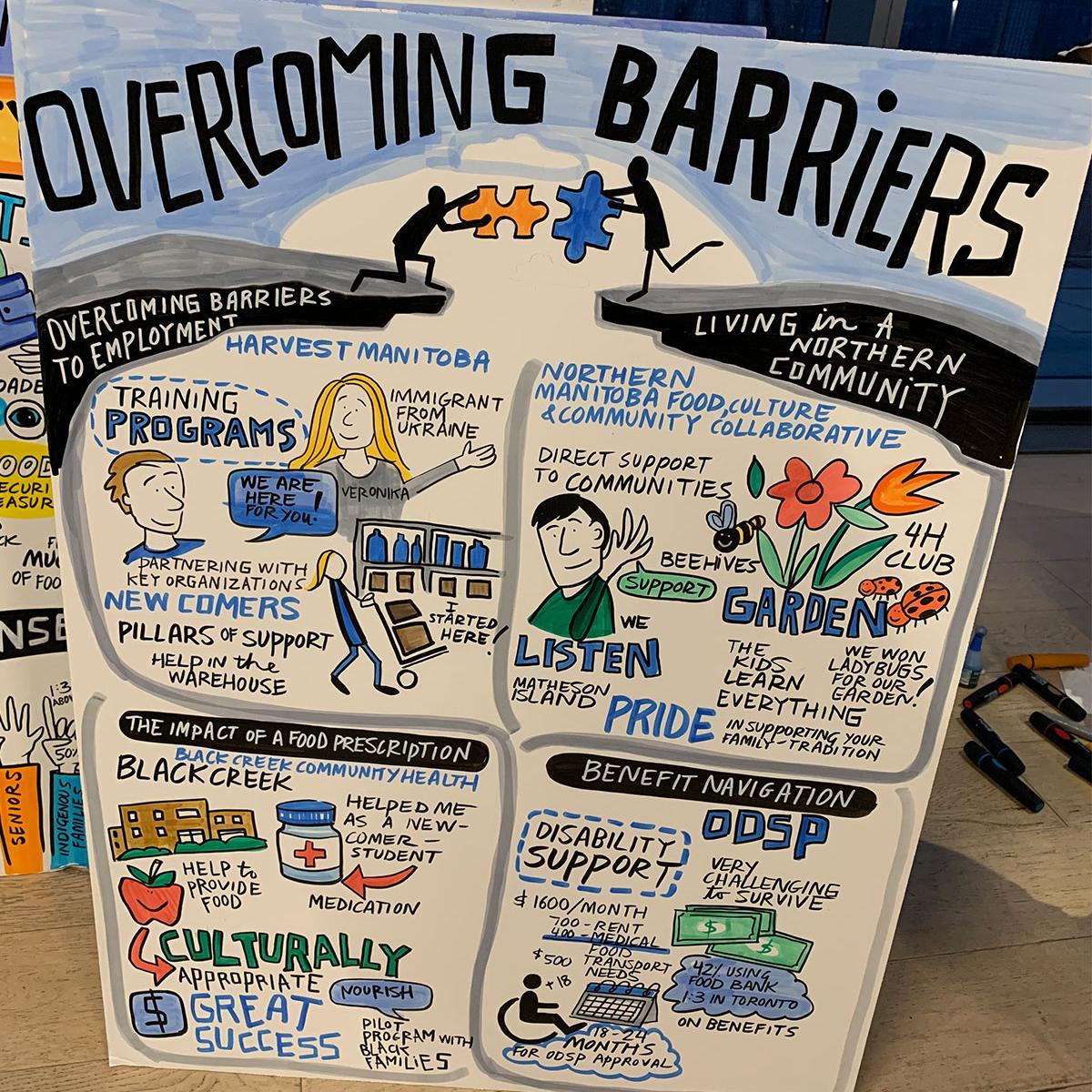
Overcoming Barriers graphic poster by artist Kathryn Maxfield.
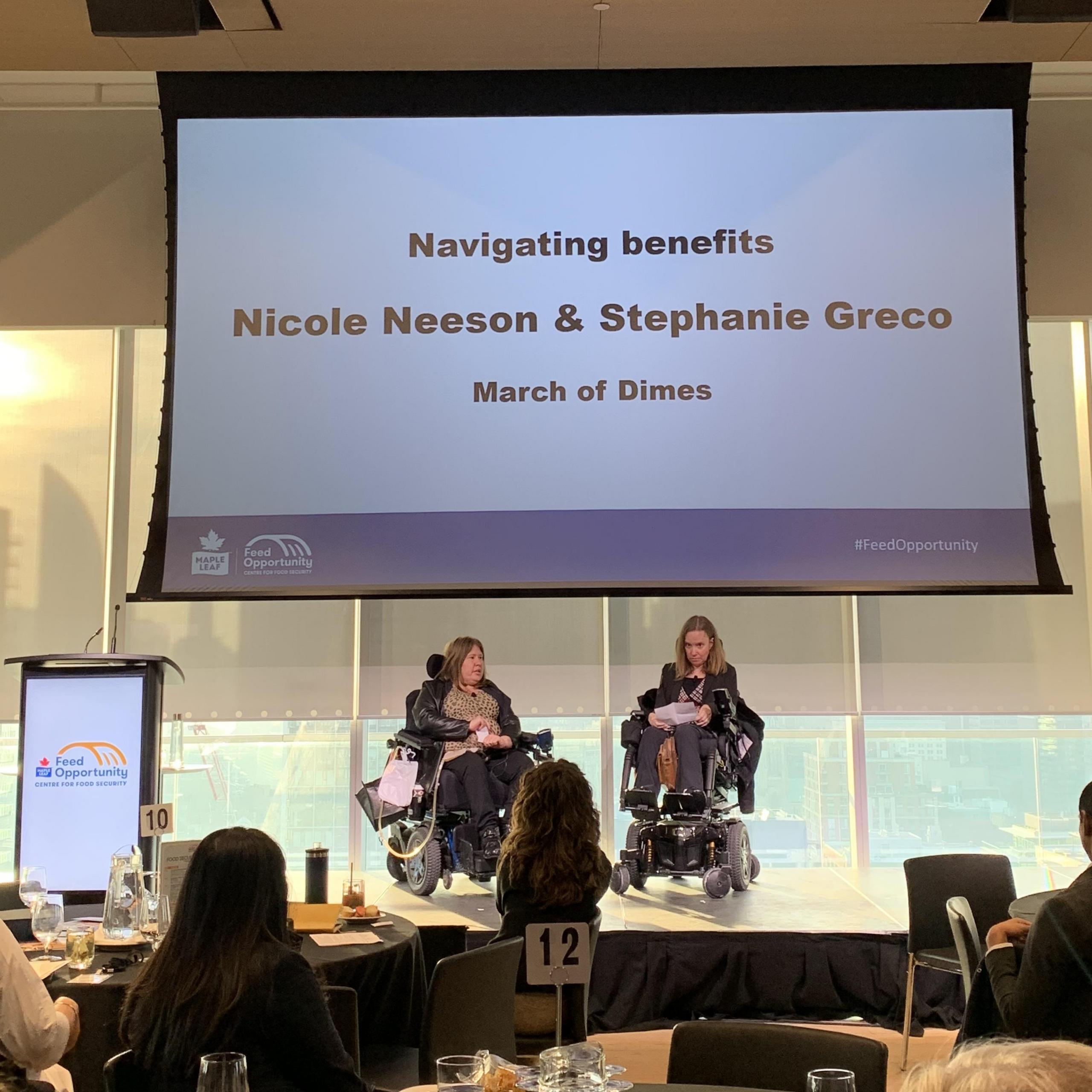
Navigating Benefits presentation with Nicole Neeson and Stephanie Greco.
Prescribing food to address health inequities and food insecurity
For the third session of the day, we looked south of the border and explored the impact of food prescription programs on improving health and food security outcomes in the U.S. With 50% of what makes Canadians sick tied to the social determinants of health, food prescriptions present an innovative way to increase nutritious food consumption in vulnerable populations.
Moderator Evan Fraser, Director at Arrell Food Institute, University of Guelph spoke with Brent Ling, Director of External Affairs at Wholesome Wave Foundation, Dr. Laura Fischer, Research Assistant Professor at Children’s National Hospital and GWU School of Medicine and Health Sciences, Taylor Newman, Director of Nutrition at Kroeger, and Dr. Ronit Ridberg, Assistant Professor at Friedman School at Tufts University.
Panelists brought deep knowledge of food prescription implementation and evaluation and spoke about the opportunity in the U.S. to advance scaled “food Rx” programs. Dr. Fischer stated that she believes clinicians should take a more active role in addressing food insecurity. “The goal is to amass the data that’s going to build the case for food prescriptions to be a medically covered benefit.”
Dr. Ridberg shared that among a surveyed population of people living with food insecurity, 66% were interested in a food prescription program. “I think there’s a huge demand in both the U.S. and other countries for support. The question is now, how do we meet that demand?” When pushed by the audience about the efficacy of food prescriptions versus giving direct cash to families to make ends meet, Brent Ling took a page from Michael McCain and noted that we could view these as ‘and’ rather than ‘or’ solutions, and that it’s important to walk through the windows of opportunity that are available to make change.
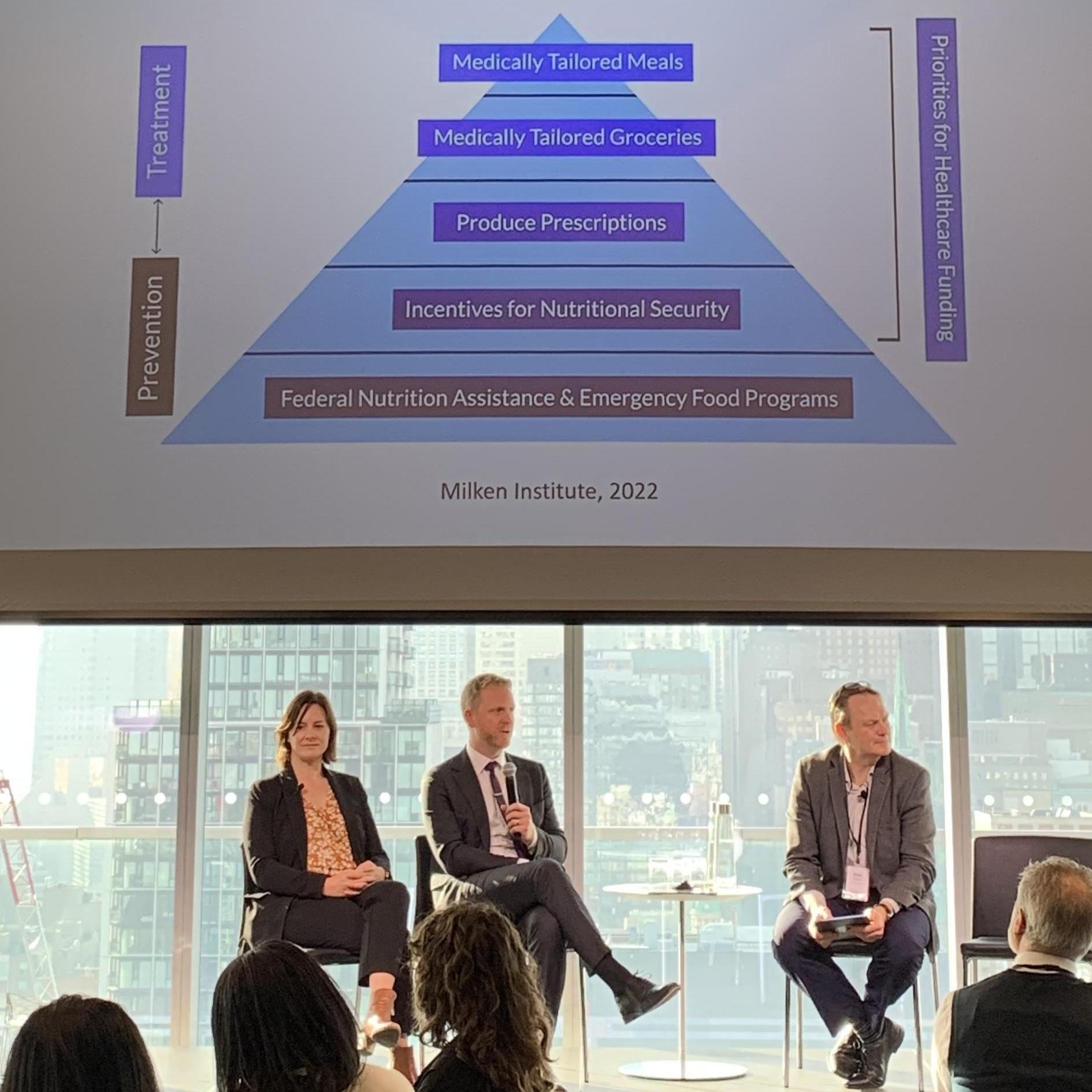
South of the Border – Food Prescribing at Scale presentation with moderator Evan Fraser, panelists Brent Ling, Dr. Ronit Ridberg, Dr. Laura Fischer, and Taylor Newman
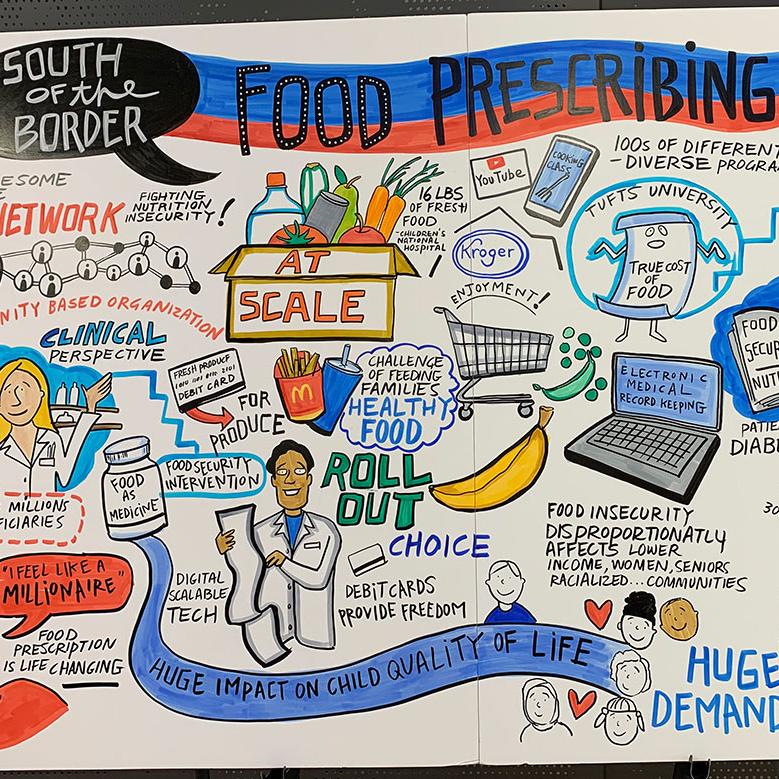
Food Prescribing poster by artist Kathryn Maxfield
Learning from the patient and successful movement for a Canada Child Benefit
In our final presentation of the day, three experts on child benefits and poverty reduction spoke of the movement that led to a significant reduction in child poverty between 2015 and 2022 — after nearly 100 years of iterative policy changes that culminated in the comprehensive Canada Child Benefit.
Moderated by Anita Khanna, National Director of Public Policy and Government Relations at United Way Centraide Canada, panelists included Matthew Mendelsohn, Visiting Professor at the Toronto Metropolitan University, Michael Mendelson, Maytree Fellow, and Laurel Rothman from Mazon Canada.
It was a discussion about finding the perfect timing to create change during windows of opportunity and the essential elements of effective policy making. “Sometimes you have to create the opportunity — for child poverty, that weekend before back-to-school was a window where we could get a lot of attention. Sometimes, it’s finding the right windows for an opportunity and other times, you have to make the opportunity,” said Laurel. Matthew spoke of the need for policies that are well-researched, where implications have been thought through, because “the devil is in the details.”
“The development of an extremely successful well-designed program that is the Canada Child Benefit didn’t happen overnight,” shared Michael. “To have a stable, mature policy that can be politically successful — it requires good policy work. This work was reiteratively based on the experiences of prior programs, along with a clear vision of what the objectives were.”
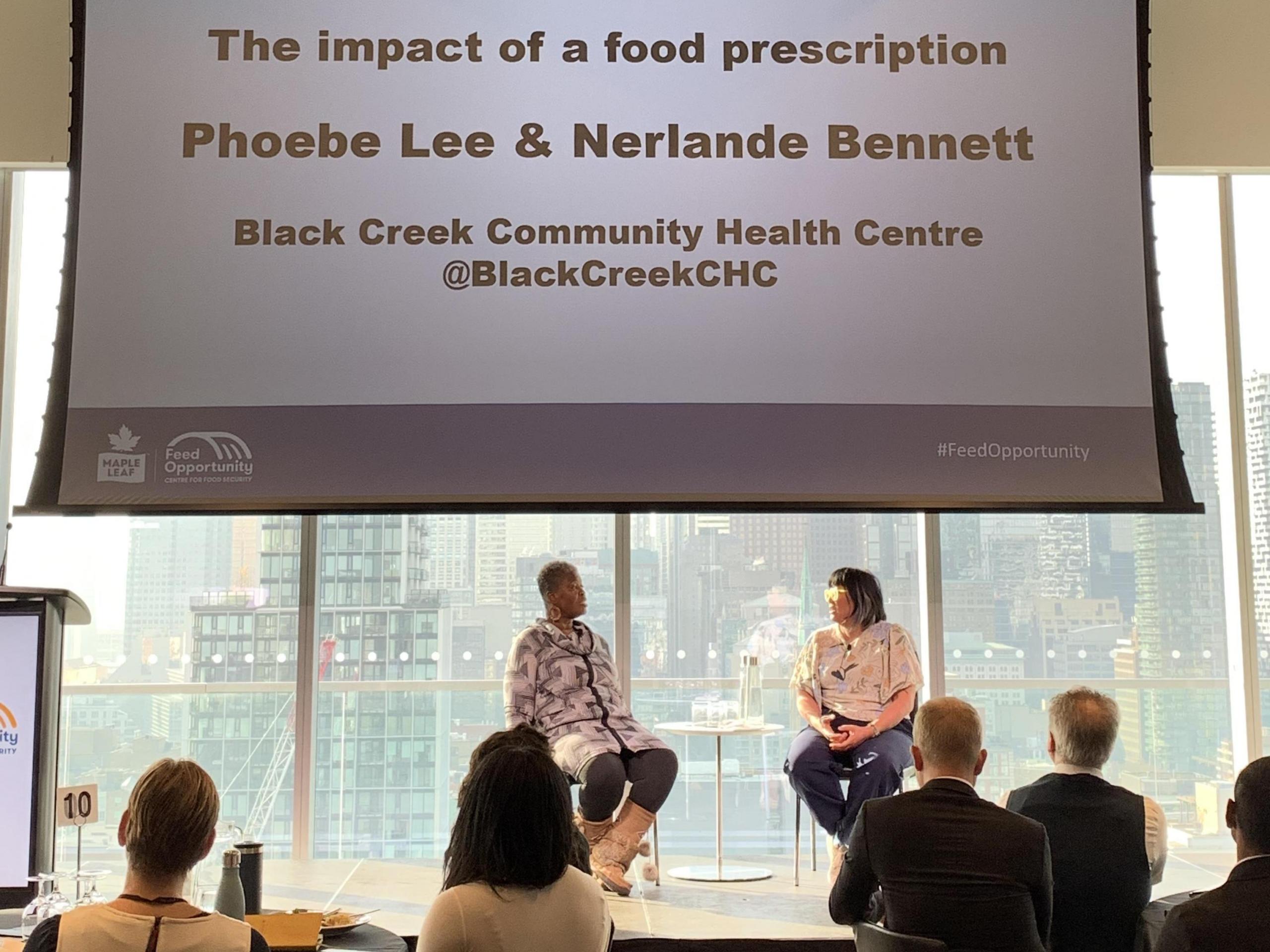
The Impact of a Food Prescription presentation by Phoebe Lee and Nerlande Bennett.
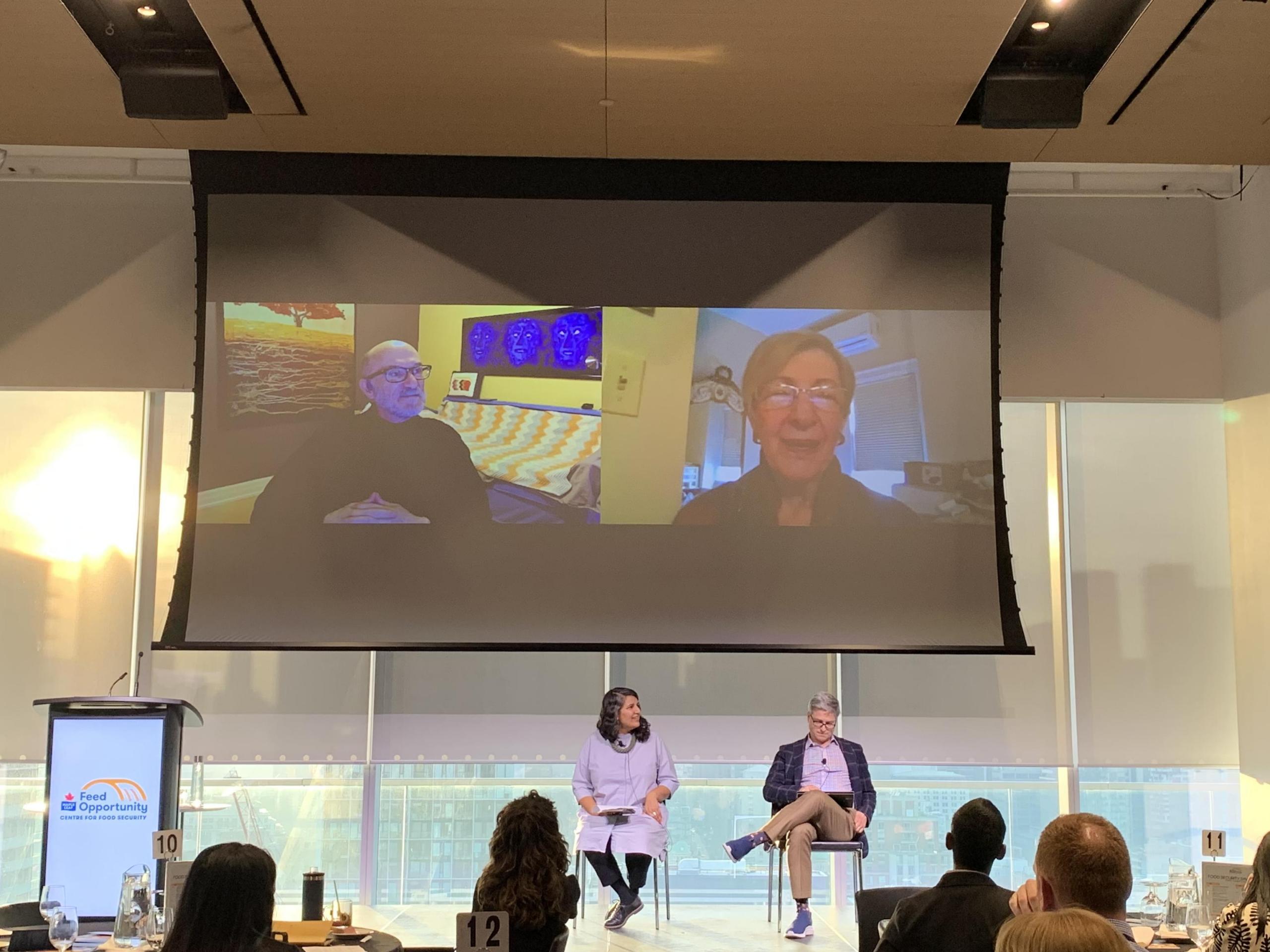
Building a Movement: Creation of the Canada Child Benefit presentation with moderator Anita Khanna, Michael Mendelsohn, Matthew Mendelson, and Laurel Rothman.
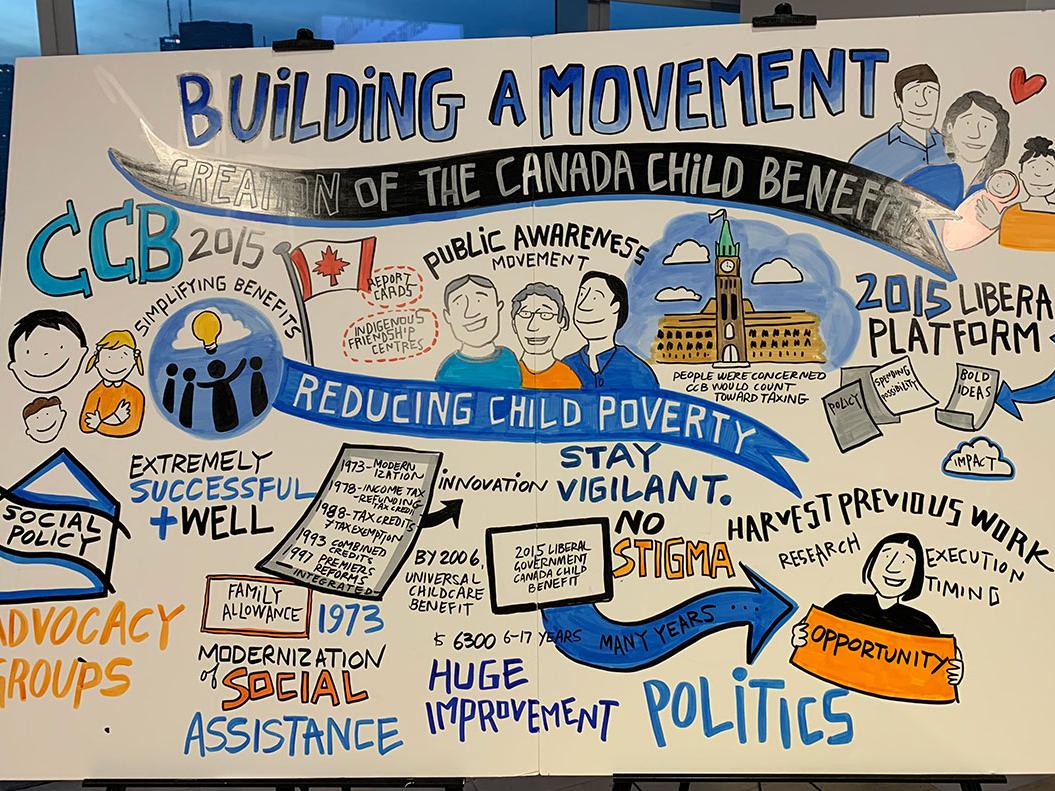
Building a Movement poster by artist Kathryn Maxfield.
Grounding in lived experience of barriers to food security
Throughout the day, we also welcomed individuals to share their personal experiences about overcoming barriers to employment, living in remote communities, receiving a food prescription, and navigating government benefit entitlements.
Thank you to Wilson Peinado and Veronika Shepotko from Harvest Manitoba, Cheryl Antonio and Tasha Monkman from the Northern Manitoba Food, Culture & Community Collaborative, Phoebe Lee and Nerlande Bennett from Black Creek Community Health Centre, and Nicole Neeson and Stephanie Greco from March of Dimes. Your lived experiences were eye opening and impactful.
Lynda Kuhn, Chair of the Centre, wrapped up the day by noting, “The sheer scale and suffering of people in Canada who struggle to feed themselves and their families compels us to accelerate the pace and impact of policy and program interventions”, and shared, “it requires a social safety net that is strong, durable, and accessible. We have the resources, the expertise and the public will. We need all levels of government to provide leadership.”
Thank you again to all who joined our Food Security Symposium — we look forward to working together to advocate for food insecurity reduction.
December 6, 2023